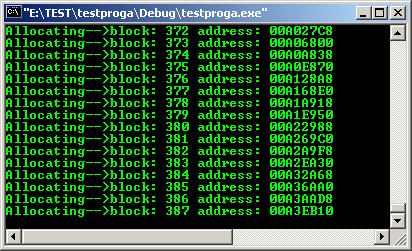| C Storage Class & Memory 1 |Main | Microsoft & C/Win32 |C++/OOP |Site Index |Download |
MODULE Z
THE C STORAGE CLASSES, SCOPE
AND MEMORY ALLOCATION 2
My Training Period: zz hours
Note: gcc compilation examples are given at the end of this Module.
The abilities that supposed to be acquired:
-
Understand and use the auto, register, extern and static keywords.
-
Understand the basic of the process address space.
-
Understand and appreciate the static, automatic and dynamic memory allocations.
-
Understand how the memory is laid out for a running process.
-
Understand and use the malloc(), calloc(), realloc() and free() functions.
|
| Z.6 PROGRAM EXAMPLES
/* playing with malloc(), memory on the heap */ #include <stdio.h> #include <stdlib.h>
void main() { int x; int *y; /* do 100000 times iteration, 100000 blocks */ for(x=0; x<100000; x++) { /* For every iteration/block, allocate 16K, system will truncate to the nearest value */ y = (int *)malloc(16384); /* if no more memory */ if(y == NULL) { puts("No more memory lol!"); /* exit peacefully */ exit(0); } /* allocate the memory block, print the block and the address */ printf("Allocating-->block: %i address: %p\n", x, y); } /* here, we do not free up the allocation */ }
Output:
|
Eventually, at some point in the run, the program will stop because there is no more memory to be allocated.
During the program run, the paging or swapping activity will be obvious because system is serving the memory request. For Windows there may be message box indicating your system having low virtual memory. The worst case, your system may hang.
The program uses the (int *) prototype to allocate 16,384 bytes (16K) of memory for every loop’s iteration. malloc() returns the address of the memory block that successfully allocated.
Whenmalloc() returns NULL, it means no more memory could be allocated. The actual size of16K chunks the program allocates depends upon which memory module/model your compiler is using.
Thefree() function de-allocates memory allocated by malloc() and every time you allocate memory that’s not used again in a program; you should use the free() function to release that memory to heap.
The following program example de-allocates the memory for the previous program.
/* playing with free(), memory on the heap */
#include <stdio.h>
#include <stdlib.h>
void main()
{
int x;
int *y;
int *buffer = NULL;
/* do 100 times iteration, 100 blocks */
for(x=0; x<100; x++)
{
/* for every iteration/block, allocate 16K,
system will truncate to the nearest value */
y = (int *)malloc(16384);
/* if there is a problem */
if(y == NULL)
{
puts("No more memory for allocation lol!");
/* exit peacefully */
exit(0);
}
/* allocate the memory block, print the block and the address */
printf("Allocating-->block: %i address: %p\n", x, y);
printf("---->Freeing the memory block: %i address: %p\n", x, y);
free((void *)buffer);
}
}
Output:
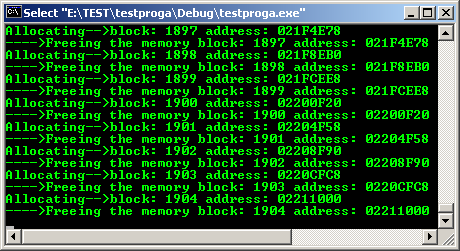
You’ll notice that the program runs all the way through, allocating memory and freeing it up so that you really never run out of memory.
free() actually doesn't erase memory; it merely flags a chunk of memory as available for re-allocation by anothermalloc() function on the heap.
The following program example demonstrates the use of malloc() and calloc() to allocate memory for an array of integers.
You should always verify if the return value from malloc() and calloc() are NULL or not because the system may have run out of memory.
/* malloc() and struct */
#include <stdio.h>
#include <stdlib.h>
struct record{
char name[15];
int age;
int id_num;
};
int main()
{
struct record *ptr;
printf("\n--malloc() & struct--\n");
ptr = (struct record *)malloc((sizeof(struct record)));
if(ptr)
{
printf("\nStudent Name: ");
gets(ptr->name);
printf("Student Age: ");
scanf("%d", &ptr->age);
printf("Student Id: ");
scanf("%d", &ptr->id_num);
printf("\nStudent Name: %s", ptr->name);
printf("\nStudent Age: %d", ptr->age);
printf("\nStudent Id Number: %d\n", ptr->id_num);
free(ptr);
}
else
printf("\nMemory allocation fails!!!\n");
return 0;
}
Output:
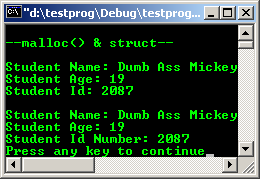
Anothermalloc() and calloc() program example.
/* playing with malloc() and calloc() */
#include <stdio.h>
#include <stdlib.h>
#define END 10
int main()
{
int *ptr1, *ptr2, *ptr3;
int i;
/* get memory for an array using malloc() - 1 parameter */
ptr1 = (int *) malloc(END*sizeof(int));
/* if memory allocation fails... */
if (ptr1 == NULL)
{
fprintf(stderr, "malloc() failed!\n");
/* exit with an error message */
exit(1);
}
/* initialize the array using array notation */
for(i = 0; i < END; i++)
{
ptr1[i] = i+i;
}
/*********************************************************/
/* getting memory for an array using calloc() - 2 parameters */
ptr2 = (int *) calloc(END, sizeof(int));
/* if memory allocation fails... */
if(ptr2 == NULL)
{
fprintf(stderr, "calloc() failed!\n");
/* exit with an error message */
exit(1);
}
/* initialize the array using pointer arithmetic */
ptr3 = ptr2;
for(i = 0; i < END; i++)
{
*(ptr3++) = i+i;
}
/* print array contents */
printf("---Using malloc()---\n");
printf("Array pointed by ptr1:\n");
for(i = 0; i < END; i++)
{
printf("%3d ", ptr1[i]);
}
printf("\n\n");
printf("---Using calloc()---\n");
printf("Array pointed by ptr2:\n");
for(i = 0; i < END; i++)
{
printf("%3d ", ptr2[i]);
}
printf("\n\n");
return 0;
}
Output:
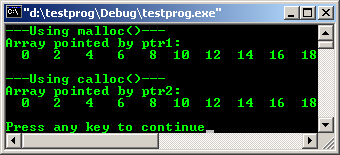
Morecalloc() and malloc() program example.
/* calloc() and malloc() example */
#include <stdlib.h>
#include <stdio.h>
#define n 10
/* a struct */
typedef struct book_type
{
int id;
char name[20];
float price;
}book;
int main(void)
{
int *aPtr = NULL, *bPtr = NULL, m = 0;
char *str = NULL;
book *bookPtr = NULL;
/* create an int array of size 10 */
aPtr = (int *)calloc(n, sizeof(int));
/* do some verification */
if(aPtr == NULL)
{
printf("calloc for integer fails lol!\n");
exit (0);
}
else
printf("memory allocation for int through calloc() is OK\n");
/* create a char array of size 10 */
str = (char *)calloc(n, sizeof(char));
if(str == NULL)
{
printf("calloc for char fails lol!\n");
exit (0);
}
else
printf("memory allocation for char through calloc() is OK\n");
/* create a structure of book */
bookPtr = (book *)malloc(sizeof(book));
if(bookPtr == NULL)
{
printf("malloc for struct fails lol!\n");
exit (0);
}
else
printf("memory allocation for struct through malloc() is OK\n");
/* clean up the memory allocated */
free(aPtr);
free(str);
free(bookPtr);
/* other way */
/* get the number of elements from the user and then allocate */
printf("\nEnter the size of integer array (bytes): ");
scanf("%d", &m);
bPtr = (int *)calloc(m, sizeof(int));
if(bPtr == NULL)
{
printf("calloc for int fails lol!\n");
exit (0);
}
else
printf("memory allocation for int through calloc() is OK\n");
free(bPtr);
return 0;
}
Output:
-------------------------------------------------------------------------------------------------------------

Program example for realloc().
/* playing with realloc(). Store user input in an array */
#include <stdio.h>
#include <stdlib.h>
#define INITIAL_SIZE 5;
int main()
{
int *Arr, *temp;
int limit, input, n = 0, r, i;
/* initially, allocate some space for A */
limit = INITIAL_SIZE;
Arr = (int *) malloc (limit * sizeof(int));
/* do some verification, if fail */
if (Arr == NULL)
{
/* display the error message */
fprintf(stderr, "malloc() failed!\n");
/* exit with the error code */
exit(1);
}
/* array loop */
printf("Enter numbers, 1 per line. End with ctrl-D\n");
while(1)
{
printf("Next number: ");
r = scanf("%d", &input);
fflush(stdin);
/* verify the input */
if(r < 1)
break;
/* get more space for Arr using realloc() */
if(n >= limit)
{
printf("More than 5 elements per loop, reallocating the storage... \n");
limit = 2 * limit;
temp = (int *)realloc(Arr, limit * sizeof(int));
/* verify again...*/
if(temp == NULL)
{
fprintf(stderr, "realloc() failed!\n");
exit(1);
}
else
printf("realloc is OK lol, proceed your input...\n");
Arr = temp;
}
Arr[n] = input;
n++;
}
/* trim Arr down to size */
temp = (int *)realloc(Arr, n*sizeof(int));
/* verify... */
if(temp == NULL)
{
fprintf(stderr, "realloc() fails lol!\n");
exit(1);
}
Arr = temp;
printf("\nContents of the array Arr:\n");
/* print the array */
for(i = 0; i < n; i++)
{
printf("%2d ", Arr[i]);
}
printf("\n");
return 0;
}
Output:
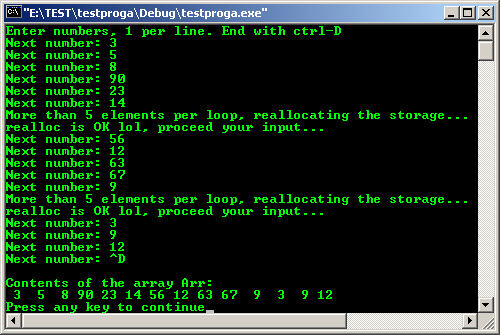
Program examples compiled usinggcc.
/* calloc() and malloc() example */
#include <stdlib.h>
#include <stdio.h>
#define n 10
/* a struct */
typedef struct book_type
{
int id;
char name[20];
float price;
}book;
int main(void)
{
int *aPtr = NULL, *bPtr = NULL, m = 0;
char *str = NULL;
book *bookPtr = NULL;
/* create an int array of size 10 */
aPtr = (int *)calloc(n, sizeof(int));
/* do some verification */
if(aPtr == NULL)
{
printf("calloc for integer fails lol!\n");
exit (0);
}
else
printf("memory allocation for int through calloc() is OK\n");
/* create a char array of size 10 */
str = (char *)calloc(n, sizeof(char));
if(str == NULL)
{
printf("calloc for char fails lol!\n");
exit (0);
}
else
printf("memory allocation for char through calloc() is OK\n");
/* create a structure of book */
bookPtr = (book *)malloc(sizeof(book));
if(bookPtr == NULL)
{
printf("malloc for struct fails lol!\n");
exit (0);
}
else
printf("memory allocation for struct through malloc() is OK\n");
/* clean up the memory allocated */
free(aPtr);
free(str);
free(bookPtr);
/* other way */
/* get the number of elements from the user and then allocate */
printf("\nEnter the size of integer array (bytes): ");
scanf("%d", &m);
bPtr = (int *)calloc(m, sizeof(int));
if(bPtr == NULL)
{
printf("calloc for int fails lol!\n");
exit (0);
}
else
printf("memory allocation for int through calloc() is OK\n");
free(bPtr);
return 0;
}
Another program example.
[bodo@bakawali ~]$ gcc memalloc.c -o memalloc
[bodo@bakawali ~]$ ./memalloc
memory allocation for int through calloc() is OK
memory allocation for char through calloc() is OK
memory allocation for struct through malloc() is OK
Enter the size of integer array (bytes): 37
memory allocation for int through calloc() is OK
/**************** malalloc.c ************************** */
/************run on FeDora 3 Machine******************** */
/* playing with malloc() and free(), memory on the heap */
#include <stdio.h>
#include <stdlib.h>
int main()
{
int x;
int *y;
int *buffer = NULL;
/* do 100 times iteration, 100 blocks */
for(x=0; x<100; x++)
{
/* for every iteration/block, allocate 16K,
system will truncate to the nearest value */
y = (int *)malloc(16384);
/* if there is a problem */
if(y == NULL)
{
puts("No more memory for allocation lol!");
/* exit peacefully */
exit(0);
}
else
{
/* allocate the memory block, print the block and the address */
printf("Allocating-->block: %i address: %p\n", x, y);
free((void *)buffer);
printf("---->Freeing the memory block: %i address: %p\n", x, y);
}
}
return 0;
}
[bodo@bakawali ~]$ gcc malalloc.c -o malalloc
[bodo@bakawali ~]$ ./malalloc
Allocating-->block: 0 address: 0x804a008
---->Freeing the memory block: 0 address: 0x804a008
Allocating-->block: 1 address: 0x804e010
---->Freeing the memory block: 1 address: 0x804e010
Allocating-->block: 2 address: 0x8052018
---->Freeing the memory block: 2 address: 0x8052018
Allocating-->block: 3 address: 0x8056020
---->Freeing the memory block: 3 address: 0x8056020
Allocating-->block: 4 address: 0x805a028
---->Freeing the memory block: 4 address: 0x805a028
Allocating-->block: 5 address: 0x805e030
---->Freeing the memory block: 5 address: 0x805e030
…
-----------------------------------o0o -----------------------------------
Further reading and digging:
Microsoft C references, online MSDN.
Microsoft Visual C++, online MSDN.
ReactOS - Windows binary compatible OS - C/C++ source code repository, Doxygen.
